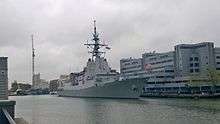Álvaro de Bazán-class frigate
 Almirante Juan de Borbón | |
| Class overview | |
|---|---|
| Name: | Álvaro de Bazán class |
| Builders: | NAVANTIA-IZAR, Astillero Ferrol |
| Operators: |
|
| Preceded by: | Santa María class |
| Subclasses: | |
| Cost: |
F101/4 €453m[1] (~US$600m) each F105 €834m[1] (~US$1.1bn) |
| In commission: | 5 |
| Active: | 5 |
| General characteristics | |
| Type: | Guided missile frigate |
| Displacement: | 5,800-6,391 tonnes[2] |
| Length: | 146.7 m (481 ft)[3] |
| Beam: | 18.6 m (61 ft) |
| Draft: | 4.75 m (15.6 ft) |
| Propulsion: |
|
| Speed: | 28.5 knots (52.8 km/h; 32.8 mph)[3] |
| Range: | 4,500 nmi (8,300 km; 5,200 mi) at 18 knots (33 km/h; 21 mph)[3] |
| Complement: | 250 (48 officers)[3] |
| Sensors and processing systems: | |
| Electronic warfare & decoys: | |
| Armament: |
|
| Aircraft carried: | 1 × Sikorsky SH-60B LAMPS III Seahawk |
The Álvaro de Bazán class (also known as the F100 class of frigates) are a new class of Aegis combat system-equipped air defence frigates entering service with the Spanish Navy. They are being built in the Spanish factory of Navantia in Ferrol and are named after Admiral Álvaro de Bazán.
The ships are fitted with American Aegis weapons technology allowing them to track hundreds of airborne targets simultaneously as part of its air defence network. The F100 Álvaro de Bazán-class multi-role frigate is one of the few non-US warships to carry the Aegis Combat System and its associated AN/SPY-1 radar. Japan's Kongō class, South Korea's Sejong the Great class, the F100-derived Norwegian Fridtjof Nansen class of frigates also use the Aegis system. Lockheed Martin, Navantia and the U.S. Navy are conducting final systems integration.
The F105 will be the basis of the Australian Hobart-class destroyer (previously known as the "Air Warfare Destroyer"). The Australian government announced in June 2007 that, in partnership with Navantia, three F100 vessels will be built for the Royal Australian Navy with the first due for delivery in 2014.
The Álvaro de Bazán-class frigates are the first modern vessels of the Spanish Navy to incorporate ballistic resistant steel in the hull, along with the power plants being mounted on anti-vibration mounts to reduce noise and make them less detectable by submarines. The original contract for four ships was worth €1,683m but they ended up costing €1,810m.[1] As of 2010 it was estimated that the final vessel, F-105 would cost €834m[1] (~US$1.1bn).
Units

6 ships were originally planned, including Roger de Lauria (F105) and Juan de Austria (F106). These were cancelled but a fifth ship was later added as the F105 Cristóbal Colón.
| Pennant number | Name | Laid down | Launched | Commissioned | Fate | ||
|---|---|---|---|---|---|---|---|
| F101 | Álvaro de Bazán | 2002 | In service | ||||
| F102 | Almirante Juan de Borbón | October 2001 | 28 February 2002 | 3 December 2003 | In service | ||
| F103 | Blas de Lezo | 2004 | In service | ||||
| F104 | Méndez Núñez | 2006 | In service | ||||
| F105 | Roger de Lauria | Cancelled | |||||
| F105 | Cristóbal Colón | 2012 | In service | ||||
| F106 | Juan de Austria | Cancelled | |||||
See also
- FREMM multipurpose frigate
- De Zeven Provinciën-class frigate
- Iver Huitfeldt-class frigate, Denmark
- Sachsen-class frigate
References
External links
| Wikimedia Commons has media related to Álvaro de Bazán Class. |
- Armada Española
- Spanish Navy page on Andrew Toppan's Haze Gray and Underway
- See Armada Española Photos
- Spanish Ship Joins TR Strike Group
- Spain: Frigate not involved in combat
- Navy unveils $11b warship contract, Australian Broadcasting Corporation, accessed 20 June 2007.
| ||||||||||